Yes. Forgive me. You have already heard the gist of all this from me, in Haifa, at the Lev Ha-Carmel Café, over strawberry ice-cream sundaes. You remember. And you dismissed it all as "Viennese angst. " I won't deny it: it is indeed angst. And perhaps even Viennese angst.
Did I ever tell you this as well?
From my window as a child, I could see the canal. There were barges. Sometimes at night a noisy holiday cruiser went past, a riot of multicolored lights. The water was spanned by two bridges, one arched and the other modern. Perhaps in your student days you chanced to pass by these places. Perhaps we passed each other in the street unawares. Night after night I could see the consumptive sidewalk artist smoking and choking, smoking as though he reveled in the agony of coughing, vomiting in the gutter, and smoking again. I have not forgotten. The row of street lamps along the quay. The shivering reflections in the water. The smell of that gray water. The streetwalker on the corner of the old bridge. The boardinghouse whose ground floor was a tavern called the Weary Heart, where I could always see art students, all sorts of women; one of them stood there once and cried without a sound and stamped her foot. On warm evenings, gentlemen wandered around as if searching for inspiration, their faces either lost in thought or bereft of hope. The souvenir vendor wandered from shop to shop. "Like trying to sell ice to Eskimos," my father would jest. Every hour we could hear the bell of the local church, over whose door was inscribed the legend THERE IS A WAY BACK in four languages, Latin, German, Greek, and Hebrew (only the Hebrew was written in curious characters, and there was a slight spelling mistake). Next to the church was the antique shop run by two Jewish partners, the fakers Gips and Gutzi, whom I told you about when we went to Degania together on the valley train. Do you remember, Mina? You laughed. You accused me of "poetic license." And you forgave me.
But you were wrong. Gips existed, and so did Gutzi. I am putting this down in writing now because I have come to the point where I feel obliged to insist, even if it means contradicting you: the truth comes first. As I wrote the word "truth," I paused for a moment. Yes, a slight hesitation. For what is the truth, Mina? Perhaps this: I did not give up Vienna for Jerusalem; I was driven out, more or less, and even though at the time I thought of this expulsion almost as the destruction of the rest of my life, in fact it gained me eight or nine years of life, and it has enabled me to see Jerusalem and to meet you. All the way from there to Malachi Street. To Mount Scopus. Almost to the edge of the desert. If I were not afraid of making you lose your temper I would use the word "absurd." You and Jerusalem. Jerusalem and I. We and the heirs of prophets, kings, and heroes. We turn over a new leaf only to smudge it with ancient neuroses. My child, my neighbors' child, Uri, sometimes shows me his private poems. He trusts me, because I do not laugh at him, and because he thinks of me as a secret inventor who is lying low because of a conspiracy while perfecting wonderful secret weapons for the Hebrew state. He writes poems about the ten lost tribes, Hebrew cavalrymen, great conquests, and acts of vengeance. Doubtless some little teacher, some messianic madman, has captured the child's imagination with the usual Jerusalemite blend of apocalyptic visions and romantic fantasies of Polish or Cossack cavalrymen. Sometimes I try my hand at writing my own educational stories, about Albert Schweitzer in Africa, the life of Louis Pasteur, Edison, that wonderful man Janusz Korczak. All in vain.
In the laundry on the roof of his house, Uri has a rocket made from bits of an old icebox and parts from an abandoned bicycle. The rocket is aimed at the Houses of Parliament in London. And I alone am responsible for the delay, because it is up to me, Dr. Einstein, Dr. Faust, Dr. Gog-and-Magog, to develop in my laboratory the formula for the secret fuel and the Hebrew atomic bomb.
He spends hours on end immersed in my huge German atlas. He is quiet, polite, clean, and tidy. He listens respectfully to what I say but rebukes me for my slowness. He pins little flags in the atlas to trace the course of the advance (with my permission, naturally). He plans a mock landing of Hebrew paratroops on the Suez Canal and along the Red Sea coast. He captures the British fleet off Crete and Malta. Occasionally I am invited to join in this game that is more than a game, in the role of Perfidious Albion, hatching dark plots, conducting desperate rear-guard actions on land and sea, in the Dardanelles, Gibraltar, the Red Sea approaches. Eventually I am forced to capitulate graciously, to cede the whole of the East to the forces of the Hebrew Kingdom, to enter into negotiations, to pencil in lightly the limits of spheres of influence, and to admit sportingly that I have lost the diplomatic war of minds just as I have already been conclusively routed on the battlefield. Only then will the ground be prepared for a military alliance, and the two of us together, Kingdom of Israel and British Empire, will be able to operate against the desert tribesmen. We would advance eastward in a carefully coordinated pincer movement until we encountered a forward patrol of the forces of the ten lost tribes, right at the edge of the map. I have permitted Uri to sketch in in blue pencil a large but Godforsaken Israelite kingdom in Central Asia, somewhere among the Himalayan Mountains.
The game is not entirely to my taste, but I join in nonetheless, and at times I even experience a certain secret thrill: A child. A strange child. My child.
"Dr. Nussbaum," Uri says, "please, if you don't feel well again, I can give you your supper. And I can go to the greengrocer's for you and to Ziegel's and buy whatever you need. Just tell me what."
"Thank you, Uri. There's no need. On the contrary; there's some chocolate in the kitchen cupboard — help yourself, and you may find some almonds, too. And then you must go home, so they don't worry about you."
"They won't worry. I can even stay overnight and keep an eye on the laboratory so you can get some sleep. Mommy and Daddy have gone away to a sanatorium. There's no one at home except Auntie Natalia, and she won't make any trouble for us — she's too busy with her own business. I can even stay out of doors all night if I want to. Or just stay quietly here with you."
"What about your homework?"
"It's done. Dr. Emanuel—"
"Yes, Uri."
"Nothing. Only you…"
"What did you want to ask me, Uri? Don't be shy. Ask."
"Nothing. Are you always… alone?"
"Recently, yes."
"Haven't you got any brothers or sisters? Haven't you thought about… getting married?"
"No. Why do you ask?"
"No reason. Only I haven't, either."
"Haven't what?"
"Nothing. I haven't got any brothers or sisters. And I… I don't need anybody."
"It's not the same, Uri."
"Yes, it is. And you don't call me a crazy child. Am I a crazy child?"
"No, Uri, you're not."
"Just the opposite. I'm your assistant. And that's a secret between you and me."
"Naturally," I say without a smile. "Now you must go. Tomorrow, if you like, we'll spend some time in the lab. I'll show you how to reduce certain substances to their elements. It will be a chemistry lesson, and you tell them that at home, please, if they ask you about your visits to me."
"Sure. You can count on me not to talk. I'll say it was chemistry lessons like you said. Don't worry, Dr. Emanuel. Bye."
"Wait a minute, Uri." I hesitate. "Just a minute."
"Yes?"
"Here, your sweater. Good night."
He leaves the house. Slips away down the back stairs. From my balcony I can watch his furtive passage among the shrubs. Suddenly I feel a surge of regret. What have I done. Have I gone mad. I mustn't. Then again: he's the neighbors' child, not mine. And naturally my illness is not catching. But all this will end badly. I'm sorry, Mina. You will certainly view this strange relationship in a totally negative light. And you will be right, as usual. I'm very sorry.
Читать дальше











